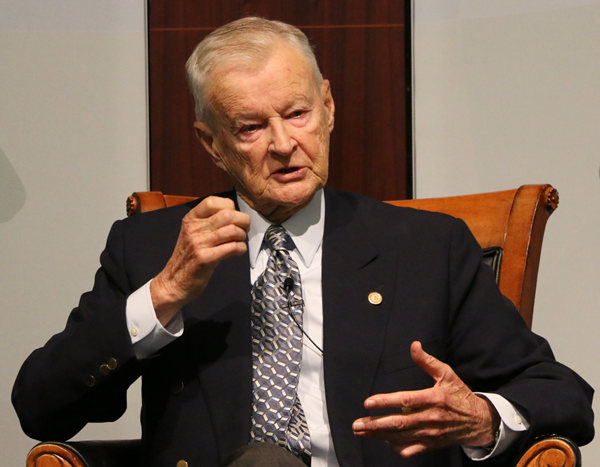 |
|
Former US National Security Advisor Zbigniew Brzezinski speaks at the Center for Strategic and International Studies in Washington on Friday. Chen Weihua/China Daily |
Zbigniew Brzezinski, a leading American strategic thinker, believes China and the United States should work more closely and avoid doing things unnecessarily provocative to each other.
The comment by the former National Security Advisor under President Jimmy Carter came on Friday, less than a week after Chinese President Xi Jinping paid a state visit to the US.
Brzezinski was referring to the frequent US surveillance planes and ships going near Chinese airspace and coast. Chinese have long protested such US activities. Sun Jianguo, deputy chief of the General Staff of the People's Liberation Army, told Harry Harris, commander of the US Pacific Command, in Honolulu, Hawaii, on Sept 30 that the US should "reduce activities that would cause misunderstanding and misjudgment."
"We do something to the Chinese every week that we wouldn't like them to do us," Brzezinski told a seminar on peace in Northeast Asia on Friday.
"Every week we fly air missions right on the edge of Chinese territory. Would we like it if the Chinese planes fly right next to San Francisco, or Los Angeles? This is a serious problem," he said, adding that US naval ships are sailing very close to Chinese territorial waters.
Brzezinski described such practice from the Cold War days as "antiquated and one-sided." "I could see that also produces some serious incidents, very serious kind of incidents," he said.
On April 1, 2001, a US Navy EP-3 spy plane collided with a PLA Navy interceptor fight jet off China's Hainan Island, causing the death of a Chinese pilot. The 24 crew members on EP-3 were detained after a crash landing in Hainan Island. The incident, which sparked nationwide protests in China against the US, caused huge setback in bilateral relationship.
Brzezinski described activities such as US surveillance missions near China's coast as of "enormous psychological and political importance."
"So we do have some elements here which need to be monitored," he said, saying both sides need to "ask themselves seriously and responsibly" whether they are doing something unnecessarily provocative to the other.
He believes there is a risk of a sudden event galvanizing latent anti-sentiments in both countries. "And we could plunge into something like that," he said.
Brzezinski, who was deeply involved in the establishment of US-China diplomatic ties in 1979, described the bilateral relationship as "so far good," but noted that the rising domestic difficulties have made the management of foreign policy increasingly difficult.
Calling the relationship "cooperative," Brzezinski said "it really doesn't cross the threshold to an alliance."
"I think, personally, it's in their interest, and certainly in our interest that we do move further towards some sort of an alliance," he said.
He explained that's because the world itself is becoming increasingly unstable, and an America and a China that are drifting apart is a counterproductive reality in that context.
"And close Chinese and American coordination on foreign policy issues could be quite productive," he said.
Chinese leaders have talked about alliance as a Cold War legacy and many in China feel the US is increasingly using its security alliance in Asia to gang up on China, such as on the East and South China Sea issues.
Jin Canrong, professor of international relations at the Renmin University of China, called the alliance Brzezinski proposed as unrealistic at this stage, but Jin said partnership is possible.
Brzezinski reminded the Obama administration to be very careful and not to make South China Sea a central issue in US relations with China.
John Hamre, president and CEO of the Center for Strategic and International Relations, said he absolutely agreed that if the US and China are on a path of tension and hostility, everything gets worse.
Describing President Xi's state visit as a good visit, Hamre, deputy secretary of defense under President Bill Clinton, said there is an unfinished business between China and the US.
While China knows that it cannot organize Asia in a way that excludes the US and the US cannot organize Asia in a way that contains China, they don’t know how to give space and full participation for everyone else in Asia, according to Hamre.
"And the reason that's so hard is everyone in Asia wants to have a good and proper working relationship with China but also wants the United States to be there for the security hedge," he said.
"How can we reconcile with that, I think that's unfinished business of this presidency and over to the next presidency,"
Despite his concerns for North Korea, Brzezinski described Asia as strategically more stable than Europe, citing tensions in Ukraine and some Baltic states.
"I don't view Asia now as a source of major international risks, with the international community as a whole in contrast, to the Middle East and in contrast to Europe," he said.
The 87-year-old expressed doubt whether the US in the long run can still operate in the global scene.
"The vast majority of Americans don't have a clue of what's happening in the world scene. And I mean it quite literally," he said, citing both the public knowledge and the foreign policy talk in US presidential race.
"They are abysmal, they are shameful, and they are dangerous. That doesn't help us operating in the international scene," he said.
chenweihua@chinadailyusa.com